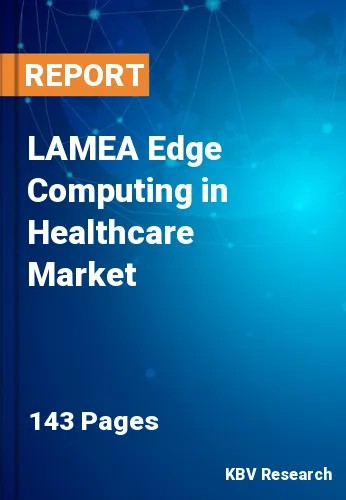The Latin America, Middle East and Africa Edge Computing in Healthcare Market would witness market growth of 30.8% CAGR during the forecast period (2023-2030).
The fields of remote patient monitoring, telehealth services, and drone delivery of lab results & medical supplies to people with little or no access to high-quality healthcare may be where edge computing technology has the biggest influence. In each of these scenarios, edge computing can reduce the expense of patient care while also speeding up the diagnosis and treatment process. Some of the developments in edge computing have been fueled in part by 5G mobile connectivity. A 5G data link that can be configured to connect directly to the emergency room of a nearby hospital can be installed in an ambulance.
AI-powered edge technologies are currently making a difference across the hospital by assisting in less invasive procedures, lowering radiation levels in X-Ray equipment, and monitoring people at fall risk. Patient health information (PHI) is kept secure and less prone to attacks & breaches by keeping data inside the device & inference at the edge.
Most of the life science sector's income is a result of technology developments and several government programs encouraging digital platforms. The industry is expanding as a result of continuous initiatives to advance clinical and e-health interoperability. The Argentine economy is projected to expand more quickly than any other regional market. Due to an expanded patient population, stronger healthcare IT infrastructure, and increased efforts to promote connected healthcare services, the healthcare industry is progressively implementing cutting-edge technologies.
Many patients, doctors, and government organizations in regional countries use telehealth and telemedicine. Remote patient and physician communication is facilitated via telehealth. By replacing the need for people to physically visit hospitals with specialized programs and video consultations, it facilitates access to healthcare. Telehealth in the Middle East & Africa is increasing swiftly due to the quick development of the digital health infrastructure. This would cause the regional market to grow rapidly.
The Brazil market dominated the LAMEA Edge Computing in Healthcare Market by Country in 2022, and would continue to be a dominant market till 2030; thereby, achieving a market value of $414 million by 2030. The Argentina market is showcasing a CAGR of 31.5% during (2023 - 2030). Additionally, The UAE market would register a CAGR of 30.4% during (2023 - 2030).
Based on Component, the market is segmented into Hardware, Software, and Services. Based on Application, the market is segmented into Telehealth & Remote Patient Monitoring, Diagnostics, Robotic Surgery, Ambulances, and Others. Based on End User, the market is segmented into Hospitals & Clinics, Long-term Care Centers & Home Care Settings, Ambulatory Care Centers, and Others. Based on countries, the market is segmented into Brazil, Argentina, UAE, Saudi Arabia, South Africa, Nigeria, and Rest of LAMEA.
Free Valuable Insights: The Worldwide Edge Computing in Healthcare Market is Projected to reach USD 25.5 Billion by 2030, at a CAGR of 26.9%
The market research report covers the analysis of key stake holders of the market. Key companies profiled in the report include Cisco Systems, Inc, Nokia Corporation, Dell Technologies, Inc., Amazon Web Services, Inc. (Amazon.com, Inc.), Google LLC (Alphabet Inc.), Microsoft Corporation, Intel Corporation, General Electric Company, Hewlett Packard Enterprise Company, and NVIDIA Corporation.
By Component
By Application
By End User
By Country
Our team of dedicated experts can provide you with attractive expansion opportunities for your business.

